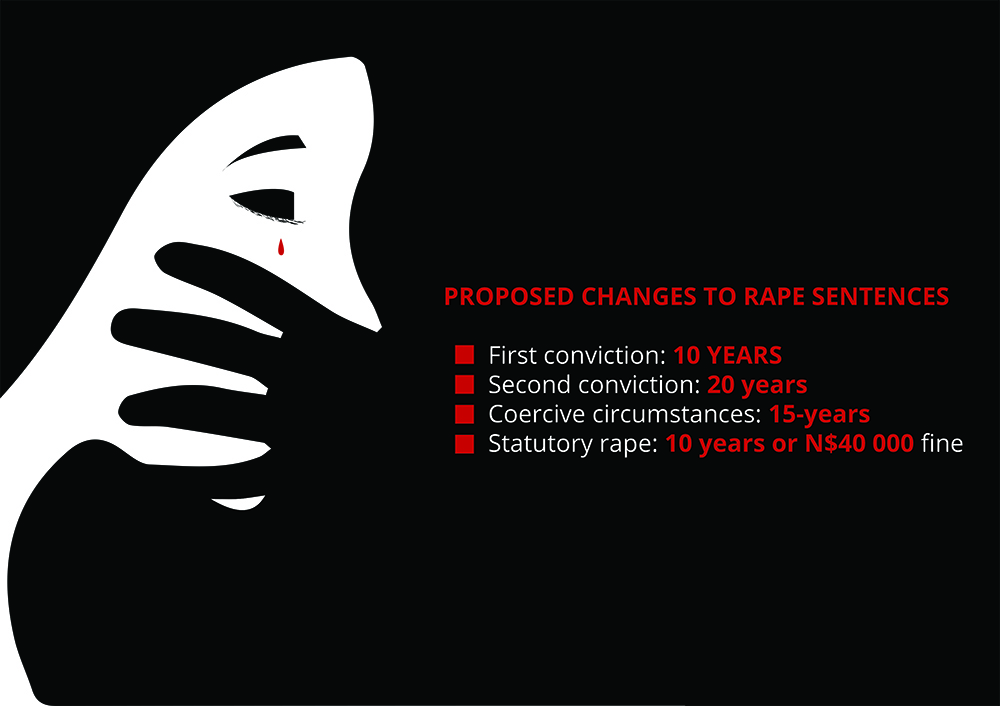By Okeri Ngutjinazo | 14 November 2019
THE government plans on tightening the laws on gender-based violence to allow for harsher prison sentences to be passed and to make it easier to secure convictions – but admits that the laws are not the main issue.
Justice ministry’s deputy executive director, Gladice Pickering, told The Namibian that cases of gender-based violence were on the rise in the country, fuelled by unemployment, alcohol abuse and low self-esteem.
However, she said the legislation is not the problem, as “Namibia has some of the most progressive laws in southern Africa on violence against women”.
National police statistics on rape and on women murdered by their partners show an alarming increase.
National police spokesperson at the time, deputy commissioner Edwin Kanguatjivi said in August last year there was a surge in the number of rape cases involving minor children, and advised parents to be vigilant.
Kanguatjivi noted that 56 rape cases had been reported across Namibia between 11 July and 24 August last year, of which 26 involved minors.
Pickering said the implementation of the legislation depends on “the availability of resources and the correct mindset of the implementers as well as the society”.
She further said legislation would only succeed if it is respected and effectively implemented, with the desired deterrent effects.
“For this to happen a conducive mindset in the law enforcement agencies and that of society as a whole is needed,” she said.
This sentiment was echoed by Regain Trust Namibia, a non-governmental organisation which offers survivors of gender-based violence free counselling.
Regain Trust has helped over 1 000 survivors of gender-based violence since it started in 2015.
Regain’s director, James Itana, said the existing laws on rape, sexual assault and domestic violence are “adequate”, but “become redundant” if they are not properly resourced.
“Service providers face massive resource constraints such as shortage of staff, police officers, prosecutors, magistrates and social workers,” he said.
CHANGES TO THE LAW
Pickering revealed that the Combating of Rape Act is to be toughened to provide for:
• A minimum 10-year jail sentence for a first conviction, up from the previous five years;
• A minimum 20-year jail term for a second conviction, up from 10 years;
• A minimum 15-year jail term where the rape is committed under “coercive circumstances”.
This applies in cases where the rapist has a sexually transmitted disease, abuses a position of trust, where the victim is gang-raped; is under 13 years of age or especially vulnerable because of physical or mental disability.
The previous sentence for such aggravated crimes was 10 years in prison.
• A minimum 20-year jail term where the rapist uses a firearm or other weapon, up from a previous 15 years;
• The sentence for statutory rape – where the victim is under 16 years of age – is set at 10 years in jail or a N$40 000 fine.
The proposed legislation also aims to make it easier to secure a conviction by stipulating that the victim’s character, sexual reputation, previous sexual conduct or lack of physical injury during the rape cannot be considered “substantial and compelling circumstances”.
The courts are also not to draw conclusions from the absence of semen or other bodily fluids or “of rupture of a complainant’s hymen”.
Bail conditions will also be tightened by requiring the courts to ensure that an accused does not contact the alleged victim.
At the same time, the Domestic Violence Act is to be amended to further protect victims of domestic violence.
Among other things, the planned amendments will:
• Allow stronger safeguards in protection orders against the intimidation of abuse victims and to protect children affected by domestic violence;
• Enable the courts to direct alleged abusers to take part in counselling or treatment programmes;
• Ensure that the courts are notified of any breach of protection orders;
• Empower the courts to suspend the firearm licence of an alleged abuser; and
• Make it possible to pursue protection orders and criminal charges at the same time.
Pickering said there had been consultations on both bills, and that after certification by the attorney general, they will be tabled in parliament next month. Commenting on the planned amendments, the Legal Assistance Centre’s gender advocate, Dianne Hubbard, said the new law was not particularly helpful in preventing domestic violence.
“It is more relevant in responding to gender-based violence that has already taken place. The law can be part of the solution, but is not enough on its own,” she said.
Hubbard said gender-based violence will stop only when society stands up together and says that it will not be tolerated. National Unity Democratic Organisation secretary general Joseph Kauandenge said the biggest problem with gender-based violence is that men have been brought up to think that they own women.
“Our society needs redirection and this must start with deliberate programmes at primary school level to redirect our young people towards a culture of treating women as equals and people to be protected,” he said.
Itana said the services currently being offered to address gender-based violence are insufficient, an issue that has not been confronted by Namibia’s political decision-makers.
Regain Trust has received complaints from survivors that they have not received adequate protection from the police or prosecuting authorities.
These institutions suffer from staff shortages, and a lack of vehicles, equipment and infrastructure such as shelters or places of safety for victims.
“All the different challenges faced by service providers are compounded and in the end this makes service provision almost impossible,” he said.
Although Namibia had a Prioritised National Plan of Action on gender-based violence, the plan does not have a budget – making it hard to implement strategies.
“Our political decision-makers such as MPs, Cabinet ministers and local authority leaders all need to prioritise gender-based violence and ensure that it receives the necessary allocations in the national budget,” Itana said.
“Unless we do this we will continue to suffer the scourge of gender-based violence in Namibia.”
VIOLENCE ON THE RISE
Police inspector general Sebastian Ndeitunga revealed that 3 164 rape cases were reported between 2016 and 2018, with 1 314 of them involving children.
In 2016, 418 rape cases involving minor females were reported to the police. This rose to 422 in 2017 and 474 last year.
“More concerted efforts need to be made towards combating rape in our country, particularly the violation of minor children,” Ndeitunga said at the opening of the renovated offices of the Khomas Gender-Based Violence Protection Unit.
Police statistics also show that between 2014 and 2019, 139 adult women were murdered by their partners. In addition, 21 minors were murdered, presumably by an adult male of the household or peer partners.
This represents an average of 27 adult women murdered every year by their partners in a population of 2,5 million. Statistics also show that 89 men were arrested for those crimes, but do not give the number of convictions.
However, 2 595 victims of gender-based violence, mostly women, withdrew their cases last year.
According to police statistics, 7 127 cases of GBV were reported countrywide in 2019 and 2 595 of these were withdrawn, while in 2018 out of 7 157 reported, 2 606 cases were withdrawn.
The majority of withdrawals were recorded in Windhoek where 1 563 cases were withdrawn out of the 3 689 reported, followed by Oshakati with 374 withdrawals out of 625 reported cases.
Trailing behind is Walvis Bay where 172 out of 384 cases were withdrawn and Outapi with 108 out of 384 cases.
TAKING INITIATIVE
Last year, the country saw the formation of NGOs who have taken on the responsibility to educate the public on issues of slut-shaming, rape and gender-based violence in the country.
Public relations officer of Slut Shame Walk, Arlana Shikongo, said her group decided to do something to bring women together for the protection of Namibian women against GBV and stigma.
“We are a part of the coalition and work as one of the channels through which victims and survivors can be connected with a legal team that will help them to report a case, or simply to connect them to various psycho-social services to work through the trauma,” she said.
SSW was modelled on the lines of the Slut Walk – a transitional movement that started in Canada in 2011, which called for an end to rape culture, including victim blaming and slut-shaming of sexual assault victims.
Shikongo said the walk, which took place on 6 April last year, was aimed at creating space and an opportunity for women to discuss, share and unpack their experiences with sexual violence and stigma. Shortly after the walk, #MeToo Namibia was created to encourage rape survivors to speak out against their abusers.
On the other hand, the Office of the First Lady’s Break Free from Violence Campaign (#BreakFree), started in 2017, has held 70 anti-violence awareness sessions, within communities and the workplace.
The #BreakFree pledge has received 40 553 pledges from individuals who have committed towards creating a non-violent society.
The Office of the First Lady said there is a growing acceptance of the fact that Namibia is experiencing a violence epidemic.
“We will find it prohibitively difficult to change violence in the public sphere if we don’t resolve the problematic mindsets being engendered in the home,” the office said.
* This article was produced by The Namibian’s investigative unit. Send us story tips via your secure email to: investigations@namibian.com.na






